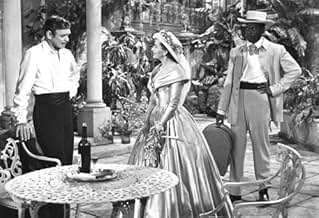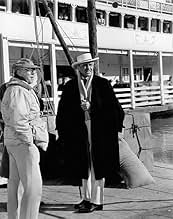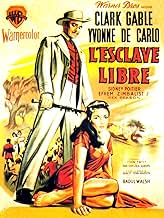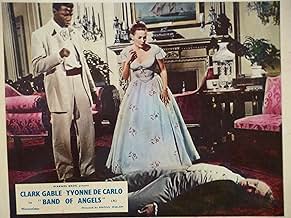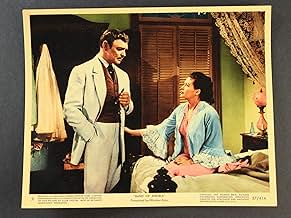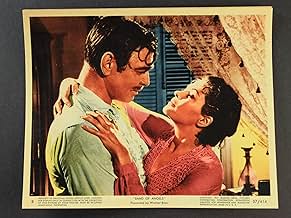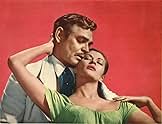Amantha Starr grandit en tant que personne privilégiée dans le sud, mais après la mort de son père, elle découvre que sa mère était noire, et son monde est détruit.Amantha Starr grandit en tant que personne privilégiée dans le sud, mais après la mort de son père, elle découvre que sa mère était noire, et son monde est détruit.Amantha Starr grandit en tant que personne privilégiée dans le sud, mais après la mort de son père, elle découvre que sa mère était noire, et son monde est détruit.
- Jimmee
- (as Russ Evans)
- Gillespie
- (uncredited)
- Auction Guest
- (uncredited)
- Auctioneer
- (uncredited)
- Maj. Gen. Benjamin Butler
- (uncredited)
Avis en vedette
One of his new charities is Yvonne DeCarlo who received one rude shock when her father died. Her mom was black, one of the plantation slaves and she is technically one also. She's not the mistress of her father's plantation, she along with the rest of the property, real and human, is to be sold for back taxes.
Gable buys her and sets her up in his New Orleans home. Also in that house is a young black man named Ra-Ru played by Sidney Poitier. Poitier, in violation of the laws of the time, has been educated. And he's acquired enough education to appreciate the situation he's in. He's got a great hate for his benefactor who he really sees as no different than other, crueler slave holders.
Today's audience which has seen Steven Spielberg's great true film Amistad about the illegal African slave trade, can appreciate far better Gable's dilemma. It's as if the owners of the Amistad grew a conscience. Gable's description of life in the slave trade when he levels with Yvonne DeCarlo is a high point of the film as is his description of the rescue of an African baby who grew up to be Sidney Poitier.
The film does borrow liberally from Gone With the Wind in terms of Gable's character. But it also borrows from Birth of a Nation. Catch the scenes at his plantation on the delta when his slaves greet him and DeCarlo coming off the riverboat. Very much in keeping with that flawed classic. Had Gable done this film at his former studio MGM, I'm sure Ava Gardner would have been cast opposite him. Though DeCarlo is fine, Ava would have made the part a classic.
Actually it's Poitier who walks off with the acting honors here. His Ra-Ru is filled with fire and passion. What Gable thought of as an act of kindness, is not perceived by Poitier as that. He's educated enough to see exactly the institution of slavery for the dehumanizing force that it is. His confrontation with another plantation owner, Patric Knowles, when he tries to force himself on DeCarlo is not something one with the slave mentality would do. Knowles makes a big mistake in assuming Poitier thinks that way.
Actually Patric Knowles has another important scene with Gable after Poitier assaults Knowles and escapes. Gable has no use for him at all. He's originally from New England and doesn't like southern aristocrats as a group. Though Knowles is reputed to be a dead shot as a duelist, Gable faces him down and makes him turn tail in my favorite scene in the film.
Band of Angels did not get the best of reviews at the time it came out. I think it was ahead of its time and can be better appreciated by audiences today.
Indeed, no one is at their best in this film--not Clark Gable, as an older and tired looking version of Rhett Butler, nor beautiful Yvonne de Carlo--each given some of the worst dialogue any actors have ever been saddled with. It's a murky tale of a plantation owner in love with a woman of mixed ancestry. Patric Knowles and Sidney Poitier try to bring some semblance of dignity to the acting but there's simply too much tripe to allow anyone to look good. And by the way, it's not based on a Frank Yerby novel, as someone has said previously. It's based on a novel by Robert Penn Warren which I hope was better than the movie. Had to be.
Only the Steiner score provides a point of interest. Certainly nowhere near the level of that other Civil War epic starring Gable. No way!
Le saviez-vous
- AnecdotesThe film proved to be a complete failure on release, both critically and commercially. Clark Gable was annoyed by the comparisons with Autant en emporte le vent (1939) and instructed his agent, "If it doesn't suit an old geezer with false teeth, forget about it." He also decided to part company with Raoul Walsh, previously one of his favorite directors.
- GaffesAt 40 minutes, the heroine takes off her stockings, which were not yet available in those days.
- Citations
Amantha Starr: You say you won't touch me. You give me your *word* as a gentleman. Well, what's to stop you from breakin' your word late one night and forcin' yourself on me while I sleep?
Hamish Bond: [grins] Only the word of a gentleman.
Amantha Starr: [late that night, unable to sleep] He said he wouldn't. But those are his footsteps, coming down the hall. Coming closer!
[listens tensely]
Amantha Starr: He didn't! Not tonight, anyway. Why not?
[Frowning at first, she thinks it over, then gradually falls asleep]
- ConnexionsEdited into La classe américaine (1993)
- Bandes originalesBand of Angels
Music by Max Steiner
Lyrics by Carl Sigman
Sung by Sarah Vaughan
Arranged by Murray Cutter (uncredited)
Meilleurs choix
- How long is Band of Angels?Propulsé par Alexa
Détails
- Date de sortie
- Pays d’origine
- Langues
- Aussi connu sous le nom de
- Andjeoski venac
- Lieux de tournage
- société de production
- Consultez plus de crédits d'entreprise sur IMDbPro
Box-office
- Brut – à l'échelle mondiale
- 315 $ US
- Durée2 heures 5 minutes
- Rapport de forme
- 1.85 : 1
Contribuer à cette page



